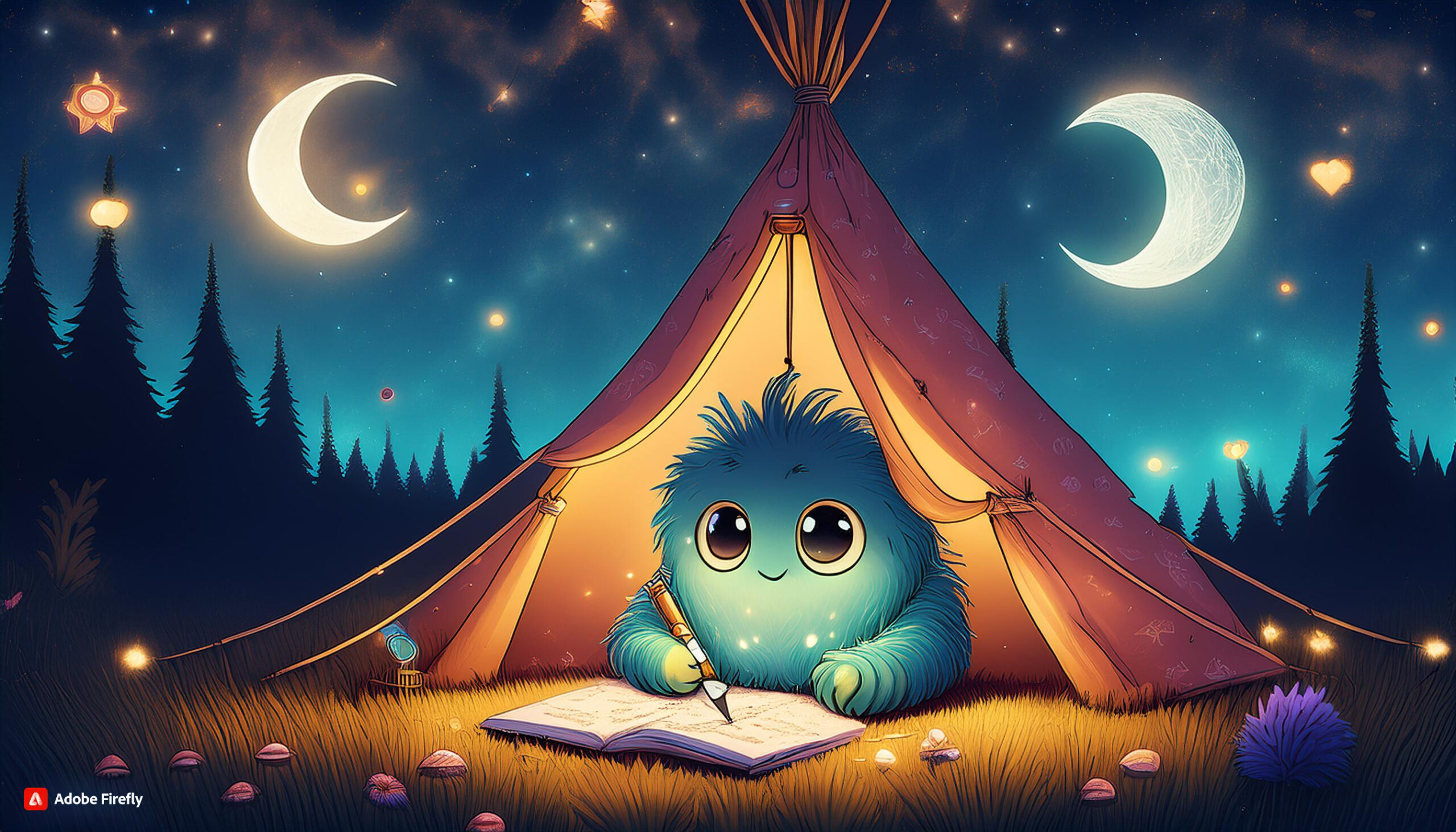If you’ve ever sat down to write just in time to stare at a blank page, you understand how difficult it can be to translate an idea into words.
Maybe you sit there for a while, fingers poised and ready, motivated to get your story started but unable to execute. You can practically hear the character screaming in your ear, but they’re muffled, held at a great distance, unavailable.
Or maybe you see the world and all the people who live in it, but you can’t yet identify the perspective character who will speak the story into existence, who’s experience of the world shares the message you want to share with your reader.
When a book idea first hits that gray matter, it tends to be rather amorphous. And when the idea is little more than a blob, focused writing is difficult, can even become a non-starter.
I get it.
Whether a story idea begins with a character, a world, or something else, it’s there, insistent and persistent. It’s a story that needs to be told, but the words don’t come.
Instead of staring at a blank page wondering how you’re going to start writing or even where to start, put away the book project. At least, at first.
Write a letter to your reader instead.

A “Dear Reader” Letter Provides Clarity
Picture your reader, no matter how clear or opaque that reader may be, with your book in their hands. Maybe they found your book at a local craft fair, or purchased a Kindle copy for their e-reader, or mined the shelves at a bookstore for hidden gems. However they found your book, they found it. They’re touching it. And they’re taking it with them. Of all the books available, a reader has chosen your story; what a delight!
With that vision of your future reader in mind, start writing to them. Title your page, Dear Reader, if you have to, but talk to that person with your book in their hands.
Why?
Writing a letter to your reader brings clarity to the why behind the book. Clarity, then, leads to purpose and process. It can help you sort out issues with your story idea before you even know they’re issues — so they won’t become gaping wounds that need to be repaired later. And writing a letter to your reader can help you see the shape of your work and how you will lead your reader from beginning to end, as well as what your reader will face along the way.
Writing a “dear reader” letter doesn’t have to come at the beginning of your story or book either. Taking the time to write your letter after you’re finished penning that shitty first draft but before you begin revisions can bring new perspective and enlightenment to your work, can help you re-envision what your book can become for you and your future reader.
Because I believe in building in public to promote hands-on experiential learning, I’m sharing parts of the letter I wrote to the reader of my novel-in-progress, set in italics, so you can get a feel for how exactly one may approach such an endeavor.
Your letter will look different than mine, of course. Use my letter as an example, but allow yourself to write with abandon if you find my letter too restricting for your communication tastes.
Onward.
Gratitude Goes A Long Way.
When penning your letter to your reader, start with gratitude, a ‘thanks for being here’ statement that communicates how important they are to you.
Tell the reader why you’re happy they’ve come into the readerly fold. Let the reader know what you admire about them, why they fit in nicely with your people, why this is the right bookish place for them to be. And don’t forget that image of the reader holding your book in their hands to really allow that gratitude to come forward.
Dear Reader,
Thanks for picking up [novel title*] — my book! — and holding it in your capable hands. You could have chosen so many other stories from authors far more practiced and celebrated than I, and accepting that you chose my novel is both humbling and telling. Humbling for reasons already shared, telling because you must share at least some of my passion for the people living on our non-sentient planet.
The world is wild in a most unnatural way: chemtrails from geoengineering, all the plastic everything, devaluation of labor, loss of contemplative time, decrease in native habitats, increase in separation of spirit from self — it all feels like so much, too much, for our feeble shoulders to carry. Yet, we press on in hope, dreaming of a better future.
Evelyn, my main character, dreams of a better future, too, one where robots don’t undercut humanity, one where wealth isn’t measured by how much cash you have but by the value you provide.
And what could be more valuable than art which shatters the soul?
Allow A Glimpse Inside
After you’re done thanking your reader and connecting with them on a person-to-person level, move into what the reader will find in the pages of your book, the ‘what’s in it for you’ statement that shares the why and heart of your message, no matter what kind of book you’re writing. For self-help, you may discuss the topics the reader may encounter. For memoir and fiction, perhaps share motifs and the theme of your work. And tell the reader why these topics, motifs, and themes are perfectly suited for them.
In this novel, you will encounter the American Dream, the hope for a better future that lives within us all, from the perspective of a woman who believes she’s lost the ability to dream.
I met Evelyn long ago now, it seems, in a place I used to live with a person I used to know. While there’s much talk of the separation between art and artist, I’m here to tell you, unequivocally, that I am Evelyn; she is me. At least, she represents a me that was, back all those years ago. Before I ended a past relationship. Before I became a mom. Before I quit my soul-sucking corporate job. Before I stood certain and strong on my own two feet. In the pages of my novel, you will follow Evelyn through the discovery and building of her own dream, one made possible by freedom. Most importantly, the freedom to choose.
Don’t Forget the Bad Stuff
You’ve invited your reader in and given them the warm-and-fuzzies. When your reader knows what to expect, they can approach your story with the right mindset. It’s important, however, not to pull the wool over their eyes.
To avoid jerking them around, let the reader know about any challenges they may encounter, including negative moments, big setbacks, and hard topics. We’re only human, after all, and the best things in life don’t come easy. So, share what may cause the reader unease. Let them know what’s coming so they can prepare for it.
Choice, however, is not without consequences. Radical freedom requires radical responsibility, a lesson Evelyn must learn as she grows into herself at a time when everyone around her already seems to know who they are and what they want. Evelyn’s path is neither easy nor short. My novel includes heavy motifs like verbal and emotional abuse, feelings of apathy and uselessness, the discomfort of being untethered, the limiting beliefs of those who never dream for something better, even death, that of a family member and that of the old self as Evelyn grows into someone new.
You may not like some of the statements I make, may take issue with some, may feel triggered. That’s okay; it’s to be expected. In my life, I’ve found triggers to be important tools for healing. If you feel triggered, step back and sort yourself out, leave your victim shoes at the door, and look ahead to the victor within, emerged.
If you want a different life than the one you have, you have to be willing to do something different with your life to get it. Sitting around waiting for the universe or anyone else to provide is folly at best, something Evelyn learns through the school of hard knocks. It’s time to get what you want, take back your power, dream, and achieve.
Invite Interpretation At the Close
Nobody likes feeling like a caged animal unable to move around and explore their space, and your reader is no different. Reading is meant to be a personal process, one that comes with self-discovery and exploration, so allow room for the self to come through your letter.
Invite the reader to define for themselves what they may get from your book knowing what you’ve shared so far.
It’s time for you to become the best version of yourself, the version you always wanted to be, and that requires accepting yourself exactly as you are — all your beauty, all your flaws, all your potential.
You, dear reader, are practically vibrating with your potential energy and power to affect great change in your life, as Evelyn changes hers. If you’re ready to realize that potential, you must put your energy in motion. Your time is now, so let’s get things rolling along this energetic highway.
Come, step into your spotlight alongside a woman stepping into her own.
Without a dream, you may never realize what you can achieve.
So, dream. With everything in you, dream.
TL;DR: Your Letter Reveals the Shape of Your Story
Writing a letter to your reader allows you to explore the concepts swirling in your gray matter, to define them, to put them into a logical order as your letter unfolds. Through your letter, you connect with your future reader, establish the tone of your work, and define your objective. By writing your “dear reader” letter, you may find you’ve told yourself the story enough that you finally understand its power, the truth of the work, the message. And once you understand your story, you will be that much more equipped to write it.
While the letter I shared with you isn’t perfect, it provides a solid foundation upon which I will construct the novel of my vision, and I invite you to do the same.
So, what will your letter say?
Happy writing.
<3 Fal
* NOTE: While I’m all about building in public, it’s also okay to keep some information close to the chest. Like some parents keep the names of their children private until birth, I shall keep the name of my WIP private until closer to delivery.
P.S. Have a topic you’d like to see covered? Let me know in the comments!
Prefer video?
Join me on MetaStellar’s YouTube channel:

Fallon Clark is a story development coach and editor with more than a decade of experience in communications, project management, writing, and editing. She provides story development and revision services to independent and hybrid publishers and authors spanning genres and styles. And in 2018, she had the joy of seeing Forever My Girl, one of her earliest book projects, on the big screen. Fallon’s writing has been published in Flash Fiction Magazine and The MicroZine. Find her online at FallonClarkBooks.Substack.com, or connect with her on LinkedIn or Substack.

